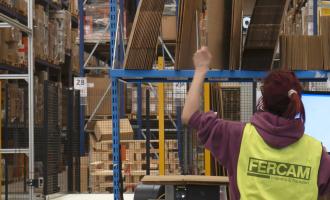
15 September 2020 - by: Eleonora Castagna
Real Time Visibility and Predictive Transport: transparency at your fingertips
One of the priorities from a logistics point of view today is to be able to establish and manage supply chains with the highest possible efficiency, in order to reduce costs, timeframes and environmental impact. This is made possible by increasingly smart systems, thanks to progressive digitization and a continuous exchange of information, in real time.

The amount of information currently available for the management of the transport sector is unprecedented. When aggregated, interpreted, and made available to key players in the shipping process, this data becomes a powerful tool to optimize performance and react promptly to unforeseen events. There are many events along the entire supply chain that can affect delivery times. For this reason, the reliability of real-time tracking information is becoming increasingly important for planning in manufacturing and commercial companies. The difficult experience at the beginning of the year due to the Covid-19 health emergency has shown the importance and value of being able to have immediately available and updated data to deal with moments of uncertainty and develop alternative plans.
But even under normal conditions, it is important for efficient logistics planning to keep every aspect of your operations under control, including fleets travelling with cargo. It is therefore valuable, if not indispensable, to monitor data through dedicated and integrable software that allows full visibility and transparency to all stakeholders involved in the shipment: the Company, the carrier, and the recipient of goods. This exchange facilitates a linear, fast flow of information that is much less susceptible to misunderstanding and error.
Optimizing transport flows also means maximizing load potential, streamlining trips to minimize empty journeys, and planning shorter routes. This immediately translates into a reduction in harmful emissions and fuel consumption of the vehicles, cleverly reducing the number of kilometers travelled.
The analysis of the combination of real-time and historical data of past trips, allows the formulation of multiple scenarios with related statistics, feeding the network of information that progressively improves its predictive capacity. The estimation of arrival and delivery times therefore becomes more and more precise, allowing accurate and reliable planning.
The digitization of the road system means that artificial intelligence systems have the opportunity to develop more and more accurate models, thanks to which we expect to increase the level of security in the near future. There will also be benefits for the maintenance of fleets and infrastructure, which can be planned and monitored on the basis of precise forecasts, only using the resources that are actually needed and again optimizing costs and consumption.
FERCAM pursues the goal of providing its customers with a service of excellence with constant commitment, especially in a situation of general uncertainty, such as the one experienced globally in recent months. Among the various companies offering reliable tracking systems, FERCAM has chosen Sixfold, the European visibility specialist, as its partner.
"Sixfold interfaces with the Transporeon platform, whose technology integrates transport management systems, vehicle telematics data, map data and forecast analysis. With over a thousand leading loading companies and about 90,000 hauliers, the system creates one of the largest international logistics networks. This gives us the great advantage of reliable data that meets a single standard for all users, hauliers and customers, both in terms of Live-Tracking and ETAs," says Hansjörg Faller, Director of Freight Management at FERCAM.
Transporeon, specialized in Software-as-a-Service (SaaS) solutions for transport and tender management, provides a platform that offers opportunities to improve transparency, reduce waiting times and create efficient end-to-end digital processes. Thanks to the improved collaboration along the logistics chain, the environment is also protected, as overall CO2 emissions are reduced.
"I am very pleased that FERCAM has chosen our solution to ensure real-time visibility of its transports. This partnership will enable FERCAM to serve its customers with the necessary transparency and reliability, with sustainable and responsible procedures, respecting the principle of real time in its work," comments Stephan Sieber, CEO of Transporeon.
Hannes Baumgartner, FERCAM's General Manager, concludes: "We have adopted Sixfold for tracking, because the extensive data network of the Transporeon platform is a good guarantee for our customers, who rightly require a transparent service for their logistics planning. Currently the service is limited to road transport, but I'm very confident that soon Sixfold will also be able to offer us a solution for intermodal transport".
But even under normal conditions, it is important for efficient logistics planning to keep every aspect of your operations under control, including fleets travelling with cargo. It is therefore valuable, if not indispensable, to monitor data through dedicated and integrable software that allows full visibility and transparency to all stakeholders involved in the shipment: the Company, the carrier, and the recipient of goods. This exchange facilitates a linear, fast flow of information that is much less susceptible to misunderstanding and error.
Better customer experience and reduced environmental impact
Integration of monitoring systems in real time allows users to avoid requesting updates by phone or email regarding the status of shipments or their estimated delivery time: the information is immediately available and usable, thanks to full tracking of the dedicated vehicle. It is therefore also possible to be more proactive in transport management, with easy evaluation of the real performance of its suppliers.Optimizing transport flows also means maximizing load potential, streamlining trips to minimize empty journeys, and planning shorter routes. This immediately translates into a reduction in harmful emissions and fuel consumption of the vehicles, cleverly reducing the number of kilometers travelled.
Predicting the future? It is no longer just science fiction
The best ally when it comes to flexibility in an uncertain situation is the highest possible level of information, which allows you to make your moves with greater insight and thus reduce the overall risk. Thanks to transparency and the sharing of an increasing amount of information, the transparency of your transport scenario crosses the border of real-time, a goal that is already revolutionary, to approach the future with predictive analysis. For example, a decisive future projection concerns the road network and road traffic, particularly in the event of accidents or traffic jams, making it possible to predict what the true impact on delivery times will be and evaluate the possibility of changing the route or resorting to other alternative solutions.The analysis of the combination of real-time and historical data of past trips, allows the formulation of multiple scenarios with related statistics, feeding the network of information that progressively improves its predictive capacity. The estimation of arrival and delivery times therefore becomes more and more precise, allowing accurate and reliable planning.
The digitization of the road system means that artificial intelligence systems have the opportunity to develop more and more accurate models, thanks to which we expect to increase the level of security in the near future. There will also be benefits for the maintenance of fleets and infrastructure, which can be planned and monitored on the basis of precise forecasts, only using the resources that are actually needed and again optimizing costs and consumption.
FERCAM is Transporeon/Sixfold's Premium Italian Partner for Real Time Visibility
FERCAM pursues the goal of providing its customers with a service of excellence with constant commitment, especially in a situation of general uncertainty, such as the one experienced globally in recent months. Among the various companies offering reliable tracking systems, FERCAM has chosen Sixfold, the European visibility specialist, as its partner.
"Sixfold interfaces with the Transporeon platform, whose technology integrates transport management systems, vehicle telematics data, map data and forecast analysis. With over a thousand leading loading companies and about 90,000 hauliers, the system creates one of the largest international logistics networks. This gives us the great advantage of reliable data that meets a single standard for all users, hauliers and customers, both in terms of Live-Tracking and ETAs," says Hansjörg Faller, Director of Freight Management at FERCAM.
Transporeon, specialized in Software-as-a-Service (SaaS) solutions for transport and tender management, provides a platform that offers opportunities to improve transparency, reduce waiting times and create efficient end-to-end digital processes. Thanks to the improved collaboration along the logistics chain, the environment is also protected, as overall CO2 emissions are reduced.
"I am very pleased that FERCAM has chosen our solution to ensure real-time visibility of its transports. This partnership will enable FERCAM to serve its customers with the necessary transparency and reliability, with sustainable and responsible procedures, respecting the principle of real time in its work," comments Stephan Sieber, CEO of Transporeon.
Hannes Baumgartner, FERCAM's General Manager, concludes: "We have adopted Sixfold for tracking, because the extensive data network of the Transporeon platform is a good guarantee for our customers, who rightly require a transparent service for their logistics planning. Currently the service is limited to road transport, but I'm very confident that soon Sixfold will also be able to offer us a solution for intermodal transport".
Share


 Language
Language

























